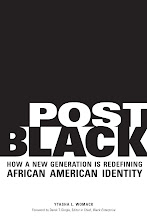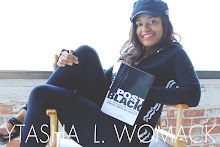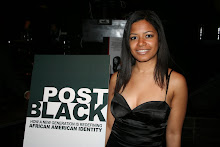Tuesday, August 17, 2010
Poetic Justice: Interview with Renaissance Writer Robert Bledsoe
Robert Bledsoe is a poet, playwright and travel writer. His book “Centennial” is currently available on Amazon.
YLW: When were you introduced to poetry? How did you become a poet?
RB: Growing up I was entered into the Academic Olympics. I was pushed into that by one of my teachers. I grew up reading. Sometimes I really wonder where I was and where were the other kids in my class. We were taught the same things, sat in the same seat, the same material was presented to us. The point I'm making is that I was a big reader especially with content that dealt with black America. So this love of literature carried with me throughout school. We read poetry, a lot from the Harlem Renaissance Era in elementary school. Poetry and reading was fun. I'd go to the library, sift through books. Looking back, I'm amazed at how much freedom I had to do this. This carried on through college where I learned more about Langston Hughes and Countee Cullen.. I have degrees in journalism, English writing and poetry.
YLW: People are always surprised to find out that you grew up in Englewood. Does the stigma placed on certain black communities bother you?
RB: Let's put it this way. If I tell people that I'm from the South Side of Chicago, specifically Englewood, people who know those areas, you can see the look in their faces. It's like “huh?” Those are areas that aren't necessarily associated with proper speech, college education, firm handshakes, wearing shirts and ties. It's an area that unfortunately is associated with what people think is black life: drugs, crime, violence, the black malaise. So when people find out that I'm from there, it takes a while for them to process. And it's not necessarily white people but black people who have this incredulous thinking process.
YLW: Why do you think people from the same neighborhoods can take very different paths? Why did you take a different path?
RB: I can't really say that there were people on the street saying "you're going to grow up to be a drug dealer", or "work hard to drop out". No one was saying that. The parents want their kids to go to school. Most of my friends growing up are doing well. I don't know if it was my block or what but most of my friends are upstanding citizens.
But in the neighborhood in general, everyone knew the family that wasn't doing anything. It would seem like it was just one or two houses per block. Everyone else was doing what they were supposed to do. But no one could really do anything about that one house. And somehow that one house really has an effect of damaging an entire community.
It was only when I got older that I realized these super burdens that we have to carry for that one house on the street. I didn't really learn the significance of that one house until later. Because that one house would come to define whole communities and that's not fair. The perception is that all these black communities are blighted and failing but that's not my experience where I grew up.
YLW: You're a poet but you're not a fan of spoken word.
RB: No. I'm more of a traditionalist. I'm a poetry snob.
YLW: Why?
RB: I think the subject matter is limited and there's too much emphasis on performance. Traditional poetry isn't always performed, it's read. [Spoken Word poets] think if you speak in a certain cadence and inflect on a certain word at the end of a sentence and almost sing, that they are saying something. To me poetry is about reaching the heart and reaching the mind and it's something that's pleasing and pleasant. It's not something jarring.
YLW: Do you think you're being a little harsh?
RB: I'm just afraid that many of our youngsters, when they think of poetry, [spoken word] is what they think about. How many of them are really learning about Maya Angelou? I wish I could say it's an education thing, but it's not. Many spoken word people are college degreed, I just don't think it's poetry. They're putting on a show. How about we remove the word poetry and call it spoken word creativity?
YLW: You have an issue with spoken word being called poetry?
RB: I think it has usurped the word poetry. Poetry is about more than 'roses are red, violets are blue'. It's a craft. I don't want to say that spoken word isn't creative, I just think there's too much emphasis on the performance part.
YLW: At the expense of the writing?
RB: Right. You're not focusing on what's being said. When you see spoken word, you're using your eyes more than your ears. I went to a Def Poetry Jam audition and I read a poem I wrote when Gwendolyn Brooks died. Here I am reading what I think is a poem, and everyone else is doing spoken word, and I said I'm so out of place here. But definitely, there was some confusion on my part on how poetry was being defined. People liked it but it wasn't the write venue.
YLW: You're a globe hopper. You're out of the country three or four times a month. Do you think travelers share a kindred spirit?
RB: It's a longing. Why does one travel anyway? If you have what you need at home, why travel? For me, the whole travel experience began with me wanting to know what more out there is there. I know that there has to be some place in the world where I feel free to be me. There's a song about that. Because the constraints that I felt being who I was on the Southside of Chicago or being one of the few blacks at a small school in rural Minnesota, the constraints on me were tight. They were suffocating.
YLW: How so?
RB: Because you couldn't be a black intellectual. That's an anomaly. It's like somehow or another, if you are not a black guy who enjoys hip hop, if you don't play basketball every weekend . . . and don't get me wrong, I like watching basketball, but I was never good at it. Somehow or another, some things were equated with black and some things were not. As a collective, I think that black people have bought into it. Travel for me was great. It's a sense of pride for me that people can see we're not this monolithic community. We don't all like hip hop, not all hip hop anyway. Some of these images are damaging. We actually speak more than just Ebonics.
We can't have our kids continue to aspire to speak bad language. And that's what they identify as being black. Maybe I'm old school, elitist, but I think the stakes are too high for us to uphold that alone as the black experience.
YLW: Why do you travel?
RB: One travels because one is seeking to discover something. One is not getting something. One wanted tea and spices so they set sail. And I set sail to just learn that there was more to life than America, and getting away from the expectations that are laid out for me. It's nice to just lay on the beach or read a book on the beach, but these things aren' t considered black if you enjoy this stuff. I don't know if you read the John Mayer stuff. (Referring to the John Mayer controversy where he mentioned having a hood pass and not dating black women).
YLW: I did.
RB: Why are there elements of our community who feel they need to have a pass and if so, why give it out? And why call it a hood pass? We need a discussion. Do we want to hold on to negative images that go out? We have to have a serious discussion on whether or not we want to move forward. I think President Obama's candidacy put a lot of this front and center. When people think black American,what do we want them to think first?
We can't discount the power of imagery and who has access to media. You can be as individual as you want, but if the collective imagery is of the hood then that individual who doesn't match the image is going to have a problem. When you step out you are combating the images of people who look like you that are thrown across TV sets across the world.
YLW: When you travel you don't deal with it?
RB: Not as much. Here it's just so entrenched. Take Eminem. How is it that Eminem can be blacker than me? Some black people would see him as blacker than me. Why? Because he doesn't speak proper English? He could put on a suit and tie and go mainstream. Do I have that option?
It's deflating and defeating to talk about because you realize how entrenched it is. If our youngsters do well in English, they're marginalized. There's no reason why in 2010 we should still be having these discussions.
Robert Bledsoe can be reached at embryonic@msn.com.
Subscribe to:
Post Comments (Atom)






No comments:
Post a Comment